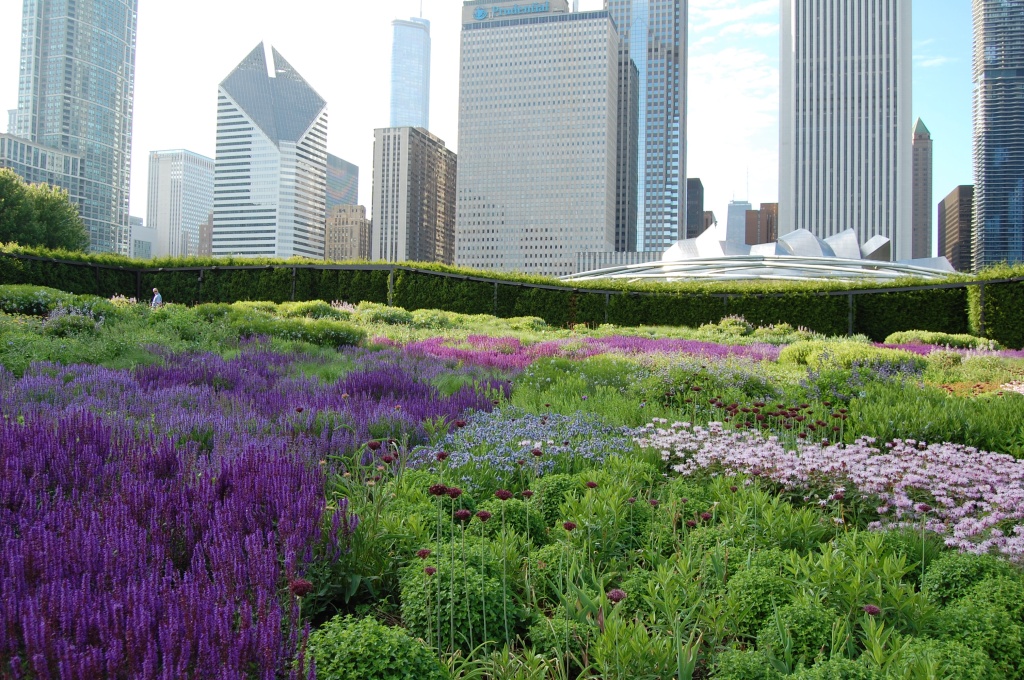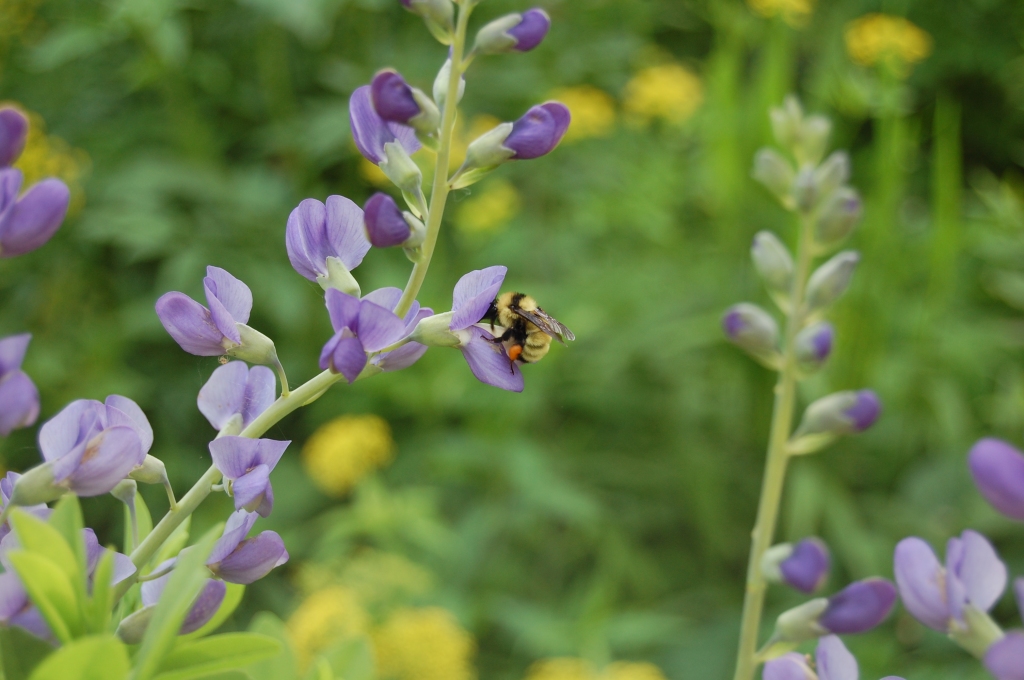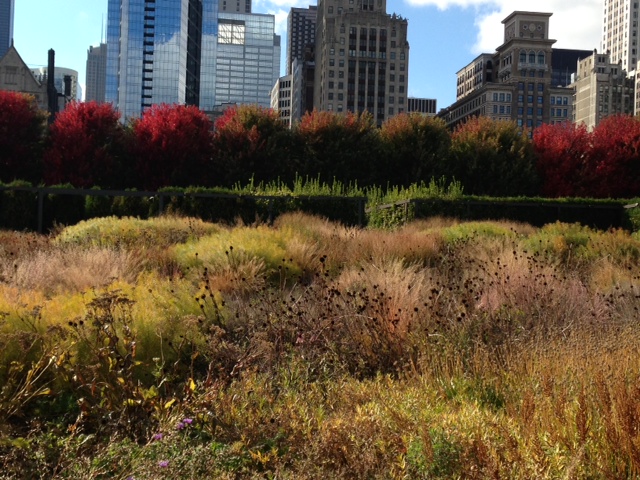Can Naturalistic Landscapes Make Us Happy?
My son sent me a link to an interesting post by Chicago Magazine’s Whet Moser. The post deals with some current research on identifying the elements that make a park look more “natural” to most people.

It was more the purpose than the results of this particular research that interested me. I’m not sure that anyone would be surprised by the qualities found to be more natural-looking – curved rather than straight edges, for example.
Marc Berman, a professor of psychology at the University of Chicago, has stated that his research could help in designing “new environments in ways that may improve psychological functioning.”
In other words, this is a new spin on the idea that exposure to nature (or something we think looks like nature) provides uplift to those who live in man-made environments.
Berman has done some research in the use of nature walks as part of a course of treatments for clinical depression. He theorizes that natural environments provide a tranquil counterpoint to the overstimulation of man-made environments, and that this can create a sense of calm and well-being.
Or, as Berman puts it:”… interacting with natural environments can have a salubrious effect on cognitive and affective processing compared to interacting with more urban/man-made environments.”

My own experience in the garden tells me there is something real behind this. Contemplating a single plant, a border, or a garden overall provides a tranquil focus for the mind and quiets worrying or distressing thoughts. Watching bees on flowers has for me the sort of hypnotic effect that some who practice meditation get from concentrating on their own breathing.
There was also a study by Frances Kuo at the University of Illinois which found that green spaces in the inner city tend to reduce crime. This runs counter to the conventional view that bushes and trees provide hiding spaces for criminals and criminal acts.
Do naturalistic gardens have this effect more than formal gardens? Perhaps. As Jens Jensen, founder of the Prairie Style of design, once said: “Straight lines spell autocracy …”. Both formal and informal gardens are designed landscapes, but the formal garden suggests control, tension, discipline. The informal garden, by definition, is more relaxed.

Jens Jensen may not have been familiar with “affective processing”, but he did say of naturalistic landscapes: “They appeal to the finer feelings of mankind and elevate the depressed in soul and mind to a higher place in the human family.”
Do you agree? Do natural-seeming landscapes in urban environments make us happier?





I think they do. they make people feel as if they are in nature and are relaxing. Where as, formal plantings have an industrial feel and remind us of rule and geometry.
I agree. Formal gardens can be appealing, but they are not relaxing in the same way.
I think that they do. I’m really glad you wrote about this topic, I think it’s so important.
Thanks.
The physiological and psychological effects are many when in a natural space, and much research has been done on this effect, the calming and safe feeling on people. One thing also studied was that as humans, we do share this type of landscape as beautiful to a time long before one was ever designed. It was found that the savannah was viewed as beautiful across all cultures, even in cultures that never experienced it. The space also had trees and water far in the distance. It was safe because humans could see and hear danger from a distance or scramble up trees if necessary. That says something about the appeal of natural landscapes, where this type of landscape was built into our very being. The basis of this desire is humanity is presumed to have originated in areas such as this.
Interesting comments. Trees represent comfort, safety, and food in the context of a savannah, as you say. In the days when most of Europe was covered in dense forest, forests were thought of as dark and threatening.
Yes the woods was dark and threatening and can be even today, yet in the research the pastoral/savannah landscape was preferred by almost everyone tested. I happen to like mountainous woods myself, but clearings would be necessary to have light and brightness. But stick me on a savannah with all those grasses and expansive views and that would be A-OK too.
I agree that they make most people feel better. Think of the folks who will drive “out in the country” if they can, to get that dose of natural landscape. The trick is the bring nature to us–there shouldn’t be a division between people and nature. It’s not really that hard to add a naturalistic garden with native plants to the average urban/suburban home/park or multi-family dwellings. We just need to commit ourselves to that goal. Good post.
I agree that it would not be difficult to make the average yard look more naturalistic – and aesthetically pleasing – with native plants. I like to think that gradually more people are doing just that.
Yes. I believe beauty is not an optional thing for our well being. To me the opposite of a natural landscape is an endless line of strip malls and there is no more soul sucking sight than that.
You’re comment reminds me of the lyrics from that Arcade Fire song: “Dead shopping malls rise like mountains beyond mountains …” And I agree, I think people need some beauty around them, it’s deadening to go without.
The visual space is not soothing to me if accompanied by the sounds of traffic. There is a nature preserve near me that I think of as the Planes Trains and Automobiles Park – it can be quite noisy.
A little off topic: I’ve had several neighbors warn me about the shrubbery around my front door providing a good hiding place for someone bent on attacking me. If someone can crawl in there AND leap out with any alacrity, they have earned my purse.
I’ve also been told to keep the shrubs away from our front door also.
Yes!! Studies have also shown that daily exposure to a naturalistic environment as simple as suburban landscaping and parks reduces anxiety and promotes a sense of mental and physical well-being necessary to help us stay healthy. Environments devoid of green spaces promote depression and contribute to a lowered immune system. Gardening is good not only for our health but those around us, too.
Those studies do seem to confirm my own experiences.
Yes, I agree! I imagine that most gardeners and naturalists know this intuitively and they’ve experienced the calming, contented feelings firsthand. I enjoyed your description of contemplating a single plant and watching pollinators on flowers–that brings me great joy, as well. 🙂
It’s a big part of the pleasure of gardening.
Perhaps we start with beauty in the eye of the beholder. One can see a straight line in a garden and say,”how orderly;” another see the same line and say, “how confining.” In line with your observation, I find it most uplifting (and interesting) to look deep into the details of a garden.
Certainly personal and cultural differences shape how we see different kinds of gardens.
Interesting post. I don’t know if inner city plantings work for other people, but they lift my spirits immensely.
That’s my starting point as well.
I do agree….when I taught my co-worker and I started an eco-club at our school. The students helped us plant a natural prairie outside the school with the help of the park district. We created paths and seating areas. It was a natural get away for the kids and it had the most amazing affects on so many of our students that I can’t help but think there is something to this. Thank you for sharing the article…I will have to check it out! Nicole
Those school prairies and vegetable gardens are such a great idea.
make us happier!!!! You are right about natural landscapes- they are meditative;-)Watching a bee or a floating butterfly is the way I relax:-) Research also found that people who spend time outdoors become more “creative” in their problem solving-makes sense:-)
Great post!
Thanks! The creativity bit does make sense as I think most people are able to think better when they are relaxed.
so true!
Similar research with similar results have been done is the UK. Gardeners certainly know they feel better when they have been working or admiring their gardens; work has also been done with young people with drug or other problems giving them the opportunity to work with nature with excellent results.
It’s nice when science confirms what we feel instinctively.
Green spaces and planting in the urban environment are absolutely key to devolving the over-stimulation caused by densely-packed, man-made things, so I would have to agree. Besides, as all gardeners know, it is impossible to upset while gardening!
Plus gardening gives you tactile sensations you can’t get from a computer screen.
Oh yes, definitely! The street I used to work in was full of formal containers with bedding plants (mostly marigolds and the such in straight rows) every summer and they didn’t do much for me at all, but on my way to work there was a tiny piece of pretty park/garden on a corner, with a bench to sit on. I always made a point of walking through it – a detour of just a few metres – and it never failed to lift my mood!
I often do a similar detour on my way to work.
Interesting post Jason, I really believe in the healing power of nature and volunteer with a Horticultural Therapy centre one day a week where folk dealing with a range of life’s ups and downs come along to spend time, either just enjoying the surroundings or working on one of the plots. We are fortunate to be located in an old Orchard with a rural surround but if there were no other options straight lines of plants must be better than no plants at all.
I didn’t know there was such a thing as a horticultural therapy center. What a wonderful idea and place to volunteer.
I couldn’t agree more. I recommend everyone read Siftings, Jens Jensen’s book–it’s full of wisdom.
I suppose I could find that online.
What an interesting post. Any gardener would agree with this. It’ s something we all know instinctively.
Exactly.
Gardens are, and should be, a sign of their times and their makers. When the black plague ravaged mankind, ordered gardens provided balance, beauty, logic, and some sense of control.
They are a sign of the times, but not always in a good way. I get your point about an orderly garden as a counterpoint to wilderness and a malevolent nature. But many formal gardens were motivated more to reflect the power and control exercised by the King, or whoever happened to occupy that particular palace.
Gardens make you stop and appreciate the basics of nature and life and allows a break from social media. When we visited London several years back, I was in awe of their small gardens every couple of blocks. Each one was filled with people reading, sitting, playing, eating – it was wonderful. I came home and wondered why we only have maybe one park per town if we are lucky.
There should be more parks and gardens, I agree.
That’s curious the suggestion naturalistic landscaping may be more beneficial. You may enjoy this article from 2012 about healing benefits of gardens. Even a picture of a nature scene can be helpful in reducing pain and anxiety. http://www.scientificamerican.com/article/nature-that-nurtures/
Great article! Thanks for the link!
Thanks for this very well-thought-out post. I think the more “natural” looking the better, because there is more nuance, more to notice, more to capture and quiet that part of our brain that needs relief from the chaos. I even feel better just walking out into the yard in the morning to fill the bird feeders. It’s quiet, it’s a preview of the day’s weather, and I can take in what’s changed from the day before. But it probably has more to do with the fact that I am not thinking about anything else.
Being able to clear your mind can be really invaluable.
They certainly make me happy! I wish more people would allow their landscapes to take on the natural look and feel, whether by allowing some of the native plants that naturally come up by themselves to thrive, or by planting natives. Green yards full of grass that take up so many of our resources are just not natural! Unfortunately, though, many cities have such strict codes that growing a ground cover of more than a certain height can actually get you fined. Cities, towns and neighborhoods need to buy into the need for natural landscapes.
I agree. But there are lots of places where people are free to get away from the traditional lawn/foundation shrub model, and I like to think that a growing minority are doing just that.
TOTALLY agree! Even a few minutes outside do wonders for my soul. In terms of formal layouts, I think that is often a continuation of its setting. The power structure of especially the 17th and 18th century, and the way the castles and manor houses were laid out, were reflected in the interior layouts – it was all about intimidation, and knowing your place. The same hierarchical thinking was echoed and continued in the accompanying gardens. Urban street patterns, of course, dictate the possible shapes and layouts of whatever planters are installed, but, per what Cathy ^^^ was saying above – they can be planted to reinforce the artifice, or softened up to appeal to our origins. Great post – I’m looking forward to reading the original article!
I agree with you that many formal gardens are about power, and the French-style gardens that were dominant in the time you mention were developed when the Monarchy was centralizing control. Though I think Marian makes a good point that in some situations a more formal, geometric design is a counterpoint to what is seen as a wild and dangerous world.
I agree, I think a little greenery even has an amazing effect, I know when I’m in the city my shoulders go up and don’t come down until I see a little green or a tree….It must be awful to have to look at a concrete jungle every day.xxx
I agree.
The Lurie garden looks wonderful! I’m a great believer in the beneficial effects of gardens and gardening. I often comment that’s it’s my natural Valium! Just walking into my garden, or any beautiful natural space, I can just feel myself immediately breathe out and relax. Berman’s theory is spot on. I wish more people could appreciate it!
The Lurie is really one of the great city gardens. We are lucky to have it in Chicago.
I do agree that being connected to nature (for instance in a garden) makes us happier.Of course any garden is a man-made environment, whatever the style. In fact, for most people, it is probably easier to connect to nature in a garden setting because it is easier to relate to than to a really wild place.
Yes, a garden is not really nature, but a collaboration between nature and the gardener.
Well, I can only speak for myself and I feel more comfortable in a natural environment. Whereas the formal landscape styles can be pretty they are too rigid for me and not as relaxing. I associate formality with that style and the feeling that everything has to be perfect. I agree with previous comments that native plants or prairie plants soften even a more formal landscape design and give it a more relaxed feel. The idea that criminals can hide better in a more natural landscape is laughable…I think they could hide just as well behind a manicured shrub.
Am I misreading this, or are you (they) saying that a naturalistic style is preferable to a formal style, with clipped hedges, knot gardens and the like? My personal preference is for the natural, but as a visitor I see charm and relaxation in a garden of any style whatsoever.
I think they/we are saying that. I agree that formal gardens can have their charm, but for me the naturalistic style is more soothing.
I agree wholeheartedly. While I appreciate the work that goes into a formal garden, they often bore me. However, a garden that bores me is better than no garden at all.
Good point.
I do agree, and if more people would actually garden for themselves I think they’d feel even better.
From my travels I get the sense that gardening is less popular in the USA than in some other countries.
As people pass your beautiful gardens in the city, I think they would totally agree with the theory.
That’s very nice of you to say. I did once have a passerby point to my garden and say, “This is a joy!”
I absolutely agree with this….my garden is my solace and it is far from formal….I love the idea that more natural gardens reduce crime….
Hi Jason, I don’t know if natural style gardens makes me more happy than formal ones – but for sure seeing pictures of the Lurie Garden always makes me feel better 🙂
Then I have to admit a well tended garden is alway a joy for a gardener’s eyes, despite its style.
True, I know a lot of people who get a lift from their well-ordered vegetable gardens.
Hello Jason, the “Gardens and Green Spaces Make People Feel Better” result comes straight out of the Ministry for the Blindingly Obvious, heavily sponsored by the Foundation for Common Sense in partnership with the Institute of “Why is this Even a Question?”
Which is funded by the Department of Redundancy Department.
For me, somewhere between naturalist and designer, strong natural elements or nature elicits a different “happy” than well-designed more formal gardens (using natives esp, but non-natives too).
I guess the degree of naturalness makes a difference to me. I like gardens that combine geometric bed shapes with full, blowsy plantings.
I don’t even need the real thing. At this time of year, just that first photo of the naturalistic planting at the Lurie Garden made me happy! 🙂
That’s nice to hear.